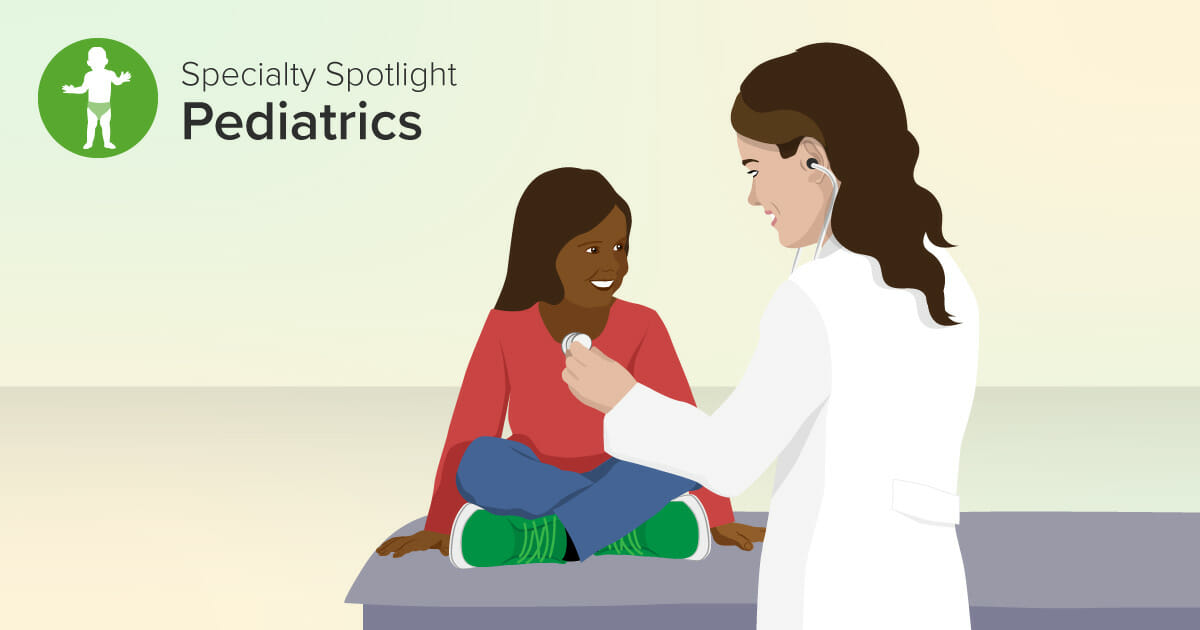What is a Developmental Pediatrician?
Developmental pediatrics is a pediatric subspecialty that focuses on the evaluation, diagnosis, and treatment of children with developmental delays or disabilities. These delays or disabilities can range from mild to severe and can affect a child’s physical, cognitive, social, or emotional development.
A developmental pediatrician works with children from birth to adolescence. One of the key goals of a developmental pediatrician is to identify any delays or disabilities as early as possible. This is important because early intervention is crucial in helping children to reach their full potential. To identify delays or disabilities, a developmental pediatrician must have a deep understanding of the normal developmental milestones that children are expected to have at various stages of their lives.
To provide a comprehensive and holistic approach to medical care, developmental pediatricians often work closely with other healthcare professionals, such as general pediatricians, speech therapists, and occupational therapists.
Take the Course: Pediatrics
Cover all pediatrics essentials and excel in pediatrics in medical school with Brian Alverson, MD
7 Tasks of a Developmental Pediatrician
1. Screening children for delays and red flags
A developmental pediatrician assessment involves evaluating the child’s physical growth, their social skills, and their ability to perceive and respond to the environment around them.
Developmental pediatricians are trained to identify any delays or discrepancies in a child’s development. Although they receive patients with obvious signs of delay, they may also work with children who have subtle delays or disabilities that might not be immediately noticeable. A developmental pediatrician screens children by observing the child’s behavior and making use of standardized tests.
| Age | Benefit of screening |
|---|---|
| 9-month visit | Might identify motor, vision, hearing, or communication problems |
| 18-month visit | Might identify motor delays, language delays, and symptoms of autism spectrum disorders (ASD) |
| 24-month visit | Might identify patients with ASD who were missed at the 18-month screening |
| 30-month visit | Might identify motor, language, and cognitive delays |
| 4-year-old visit | Screen for school readiness (e.g., fine motor, gross motor, handwriting, communication, and self-help skills) |
2. Conducting a Developmental Pediatrician Assessment
A comprehensive developmental pediatrician assessment is helpful to evaluate a child’s physical, cognitive, and behavioral development. This can include testing a child’s vision, hearing, and language skills, as well as assessing their fine and gross motor skills, cognitive abilities, and social-emotional development.
3. Coordinating with other healthcare professionals
In order to assess whether a child has a developmental disability, developmental pediatricians have to rule out other causes of delay. For example, children with speech delay might have difficulty speaking because of an underlying cause, such as hearing problems or deafness. In some cases, if this is addressed, the delay is resolved. Other times, developmental pediatricians have to coordinate with other doctors to identify the causes of delay, such as a genetic syndrome or congenital anomalies.
During treatment, developmental pediatricians coordinate with therapists who can cater to the specific needs of their patients, whether it be a speech therapist for speech delays or a physical therapist for motor delays. Coordinating with other healthcare professionals is vital so the children will receive the most comprehensive assessment and care.
4. Making a diagnosis of developmental delay or disability
Developmental pediatricians determine whether children fit the criteria of various developmental disorders, such as global developmental delay, cerebral palsy, autism, or intellectual disability. This may involve reviewing medical records, conducting additional testing or evaluations, and consulting with other healthcare professionals to identify any medical causes, such as congenital anomalies that can have effects on hearing or speech.
Sometimes symptoms can be subtle and do not meet all the criteria upon assessment, so a child is not diagnosed right away. When this occurs, patients are re-evaluated after a certain period of time.
5. Provide a treatment plan
Once a child undergoes assessment by a developmental pediatrician, a diagnosis is made and a plan for care is discussed with parents and other caregivers. This can include watchful observation, therapy sessions with speech therapists or physical therapists, and behavioral therapy. Medications or other medical interventions are sometimes given, but not routinely.
6. Educating parents and caregivers
In addition to providing direct care to children with developmental delays or disabilities, developmental pediatricians also play a role in educating parents, caregivers, and other healthcare professionals about these conditions and how to support children with developmental delays or disabilities.
This may involve providing information about available resources, helping parents advocate for their child’s needs in school or other settings, and educating them about how to support a child’s development at home.
7. Providing guidance and emotional support
A diagnosis of developmental disorder after assessment by a developmental pediatrician can be overwhelming for a parent. Developmental pediatricians also provide support and guidance to families to help their child reach their full potential.
I have experienced some parents feeling a state of denial at the possibility of developmental disability. Even just the consideration that their child may have a disability makes them feel hopeless and discouraged. Developmental pediatricians also provide reassurance and encouragement to parents and families.
Related videos
5 Domains a Developmental Pediatrician Assessment Covers
Developmental pediatricians evaluate a child’s development in 5 key areas or domains. At every age, there are certain skills in each of these 5 areas that a child should be able to perform. If they are unable to do it at a certain age, these are considered red flags and should be evaluated further. Children with developmental delays may have problems in one or more of these domains. The 5 key areas are the following:
1. Gross motor skills
These are physical skills that involve a larger group of muscles to perform. Actions using gross motor skills usually involve the whole body. Examples of gross motor skills include walking, running, jumping, kicking, and throwing.
2. Fine motor skills
These are physical skills that involve a smaller group of muscles and smaller areas of the body. Actions using fine motor skills usually affect one area, such as the hand, or wrist. Examples of fine motor skills include opening a doorknob, writing, using a pair of scissors, tying shoe laces, and opening boxes.
3. Speech and language skills
These are the skills that evaluate how a child communicates with others. During infancy, children communicate by crying. As they grow, they are able to form sounds, and syllables, and eventually are able to say words, phrases, and sentences. Children are expected to communicate effectively in a way that is at par with their age.
4. Cognitive skills
These are the skills that involve how the brain processes information. These include comprehension, reasoning, and thinking. Examples of these include mental skills such as mathematics, memory, and problem solving.
5. Social and emotional skills
These are the skills that assess how a child interacts with other people and how they regulate their emotions. Examples of these include self-awareness, self-control, self-confidence, resilience, and showing empathy.
3 Benefits of Being a Developmental Pediatrician
The environment for a developmental pediatrician can vary depending on the setting in which they work. Some may work in a hospital or clinic setting, while others may work in private practice or consult with schools or other community organizations.
1. Developmental pediatricians mostly see children in the outpatient setting
There are a few developmental disabilities that are emergency cases. Usually, when a patient with a developmental disability is brought to the ER, it is due to another medical concern such as aspiration, poor feeding, or infection.
If you are considering a career in developmental pediatrics, there are fewer time restrictions in that there are only a few emergencies that would warrant an immediate evaluation. In this way, the field is more relaxed in terms of time. Some individuals may also work in research or education and can provide telehealth services to patients remotely. Unlike other specialties, this field is more laid back and flexible.
2. Developmental pediatricians follow their patients to adolescence
Once a child is diagnosed with a developmental disability, follow-ups are necessary. This is to monitor the child’s progress and to check whether they are developing to their fullest potential. In the beginning, children may be checked a few times a month, with the interval increasing as signs of progress are observed.
Once a treatment plan is formed, follow-ups can increase to monthly, quarterly, and then yearly. This field is good if you want continuity of care, and you like seeing patients for the long term.
3. Developmental pediatricians work with a team
A developmental pediatrician rarely works alone. To provide holistic and comprehensive care for children with developmental disorders, other healthcare professionals are involved. These include general pediatricians, speech therapists, physical therapists, and other specialties. Children with developmental disorders may also be referred to a genetics expert if there is consideration of syndromes. They may be referred to other specialties, such as surgeons, ophthalmologists, and otolaryngologists.
Finally, you will also be working closely with their families to ensure that the treatment plan is being carried out at home. Being a developmental pediatrician is good if you are a team player, you have strong interpersonal skills, and you like working with other healthcare professionals.
How Much is a Developmental Pediatrician Salary?
The developmental pediatrician salary in the United States can vary widely depending on factors such as location, experience, and specialty. According to Salary.com, the developmental pediatrician’s salary in the United States is $164,000 but usually ranges from $140,000 to $195,000.
Final Thoughts
The field of developmental pediatrics plays a crucial role in supporting the development and well-being of children with developmental delays or disabilities. It requires a deep understanding of child development, as well as the ability to work with children and families from diverse backgrounds. By identifying and addressing developmental delays and disabilities early, developmental pediatricians can help children reach their full potential so that these children can lead fulfilling lives.
It is a challenging yet rewarding career choice. If you have strong interpersonal skills and a passion for helping children reach their full potential, then being a developmental pediatrician may be the right career choice for you.




